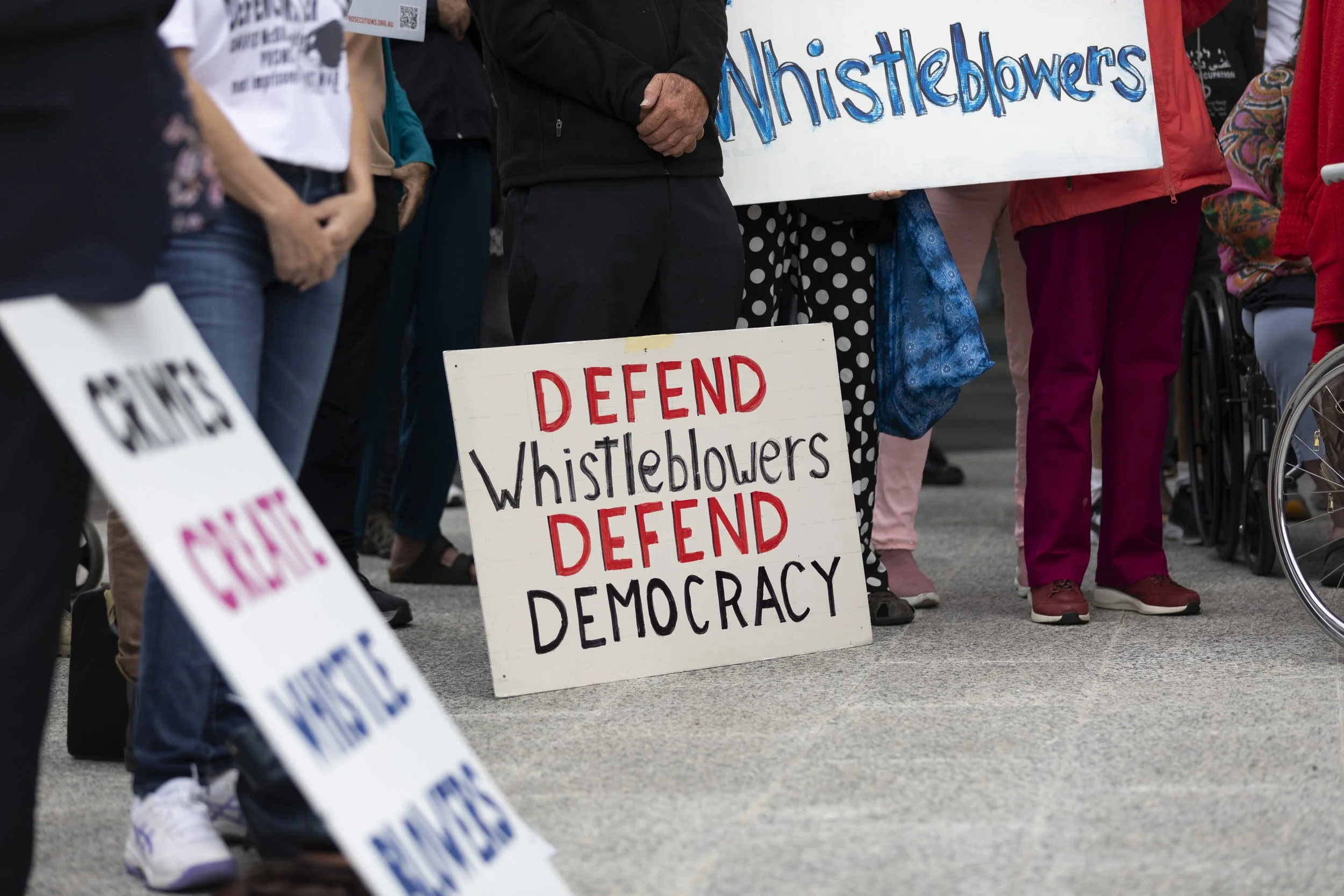Whistleblower Project
Legal support to protect and empower whistleblowers
Whistleblowers make Australia a better place. By speaking up about human rights abuses, government wrongdoing and corporate misfeasance, whistleblowers play an important role in our democracy. Unfortunately, many people who do speak up face reprisal for doing so.
The Human Rights Law Centre’s Whistleblower Project is Australia’s first dedicated legal service to protect and empower whistleblowers who want to speak up about wrongdoing. We provide legal advice and representation to whistleblowers, as well as advocating for stronger legal protections and an end to the prosecution of whistleblowers. Our legal service is free and whistleblowers can contact us on a confidential basis.
Legal help for whistleblowers
-
A whistleblower is typically an employee, contractor or other worker who has access to information regarding wrongdoing, that is not otherwise known to the public, who discloses that information. This disclosure is sometimes made to an internal whistleblowing mechanism, or to an external oversight body, or to the public. Typically, whistleblowing involves disclosing incidents where law or processes have been breached, which may include human rights abuses, fraud, corruption, maladministration, harassment, threats to health and safety or environmental wrongdoing.
The above is not a legal definition. In Australia, the law is complex and varies depending on whether the organisation who has committed the suspected wrongdoing is a federal or state/territory government agency or a company. The threshold for whistleblowing and protections afforded to certain disclosures varies and expert legal advice is often necessary to determine correct procedures and the availability of protections.
-
We are a community legal centre with limited resources. We cannot assist everyone. We have developed prioritisation guidelines to guide our service delivery – we will priorities whistleblowing that helps address the suffering of others (such as human rights abuse and misconduct relevant to the Human Rights Law Centre’s other impact areas), whistleblowing which may have systemic or strategic relevance (such as by being a test case for stronger protections), federal public sector whistleblowers, and whistleblowers who are suffering as a result of their whistleblowing (such as because they have experienced retaliation). Where we cannot assist, we will seek to offer referral pathways.
We provide advice in relation to whistleblower protection – not employment issues at large. We cannot provide legal advice on workplace grievances like bullying or interpersonal disputes.
Our Project focuses on whistleblowers and whistleblowing in Australia. In rare circumstances we will consider helping whistleblowers outside of Australia but only where there is a significant connection to Australia – for example where a government body or an Australian-registered company is committing misconduct abroad.
-
We can provide advice and assistance when navigating the disclosure pathway to minimise risk
We can provide advice and representation where you have already blown the whistle and faced reprisal, including litigation to vindicate your legal rights and protections
We also work on law reform and conduct strategic litigation to create stronger laws and protections for whistleblowers.
-
The Human Rights Law Centre is unable to receive disclosures containing intelligence information or information with a national security or other protective security classification. You must not send us any such information – doing so may be a criminal offence. If you are unsure whether information you wish to disclosure to us falls within these categories, please contact us first – without disclosing the information – for a preliminary discussion. If, contrary to this notice, you provide us with such information, we will delete it immediately and provide no further assistance to you. More information about what constitutes intelligence information or information with a national security or other protective security classification can be found here.
Contact us
If you are a whistleblower and need legal assistance, please complete this intake form.
The information you provide is confidential and securely stored on the Rely platform, which is specifically designed for whistleblowers. We review all inquiries and will respond to you as soon as possible. Please note we are currently experiencing increased demand for our assistance, and there may be some delays in our ability to consider your inquiry.
By submitting an inquiry, it does not mean that we act for you or that we are your lawyers. This form is for us to assess your matter and consider whether we are able to assist you.
Please do not attend our office in-person - we regrettably cannot accommodate walk-ins.
Resources for whistleblowers
-
Most whistleblowing laws allow you to seek advice from a lawyer about your whistleblowing. Whistleblowers under the federal government’s public sector whistleblowing regime, the Public Interest Disclosure Act 2013, are entitled to protections when they make disclosure to a lawyer for the purpose of obtaining legal advice, or professional assistance, in relation to making a public interest disclosure. Similarly, private sector whistleblowers are protected if they make a disclosure to a lawyer for the purpose of obtaining legal advice or legal representation in relation to protections in the Corporations Act 2001.
If you are unsure whether you are lawfully-permitted to disclose information to us, please contact us – without disclosing the information – and we can provide further guidance.
-
Client legal privilege, also known as legal professional privilege, applies to communications given or received for the dominant purpose of giving legal advice or the provision of legal services, or in the situation where litigation is pending or anticipated. Initial contact between prospective clients and the Human Rights Law Centre will typically be protected by client legal privilege. The confidential communications are protected from compulsory production in the context of court and similar proceedings. We take privacy and information security seriously – our privacy policy can be found here.
-
While many whistleblower protection laws expressly protect disclosures to lawyers for the purpose of seeking legal advice, we consider it prudent for clients to adopt rigorous information security practices. Following the initial intake process, we typically communicate with clients using the free, encrypted messaging and phone app Signal. You can find instructions for installing Signal on your phone, tablet or computer here. For ongoing email correspondence, clients may wish to create a dedicated ProtonMail account – a free, encrypted email service. You can find instructions for installing Protonmail here. If for some reason you are not able to use the intake form above, the Whistleblower Project can also be contacted via email: hrlc.wbp@proton.me
If you have concerns about contacting us via secure electronic channels, please download this form, complete it, and return it to us via post or secure email. Please do not attend our office in-person - we regrettably cannot accommodate walk-ins.We recommend that you do not contact us from your office or work phone or email, and avoid speaking to us at your workplace or using your workplace’s wifi. For maximum information security, you may wish to contact us using a VPN.
-
This webpage provides a general summary of aspects of whistleblowing law, for informational purposes only. It does not constitute legal advice, is not intended to be a substitute for legal advice and should not be relied upon as such.
The Human Rights Law Centre is proud to be a member of the Whistleblowing International Network (WIN), a global network of organisations protecting whistleblowers.










